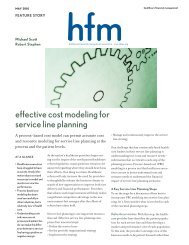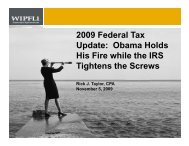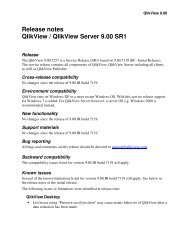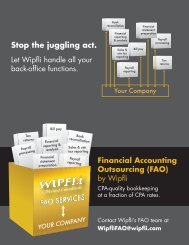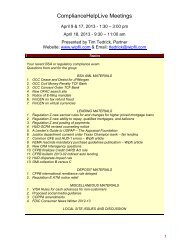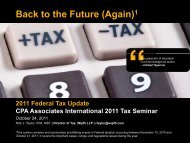Download PDF - Wipfli
Download PDF - Wipfli
Download PDF - Wipfli
You also want an ePaper? Increase the reach of your titles
YUMPU automatically turns print PDFs into web optimized ePapers that Google loves.
South Africa Update continued<br />
■<br />
a benefit from its activities. This is a facts and<br />
circumstances case. Factors such as control over the<br />
distribution and reinvestment policies, annual business<br />
plans, corporate strategy, capital expenditure, raising<br />
finance, winding up of the entity, voting rights or the<br />
power to appoint or remove the board of directors will<br />
be taken into account on a case-by-case basis. This<br />
concept is derived from financial accounting principles.<br />
The ownership thresholds in respect of the dividend and<br />
capital gain participation exemptions in relation to foreign<br />
shares will be reduced from 20% to 10%. This lower<br />
threshold is consistent with the global economic<br />
concept of direct foreign investment.<br />
The proposed amendments will apply to the net income<br />
of a controlled foreign company relating to the year of<br />
assessment beginning on or after 1 April 2012.<br />
CFC restructurings<br />
In terms of existing law, South African resident companies<br />
can restructure their affairs through various transactions<br />
falling within the so-called reorganisation rollover rules.<br />
In terms of these rules, the transactions themselves are<br />
from tax but any gain is deferred until a later disposal.<br />
The rollover rules apply to asset-for-share transactions,<br />
amalgamations, intra-group transfers, unbundlings and<br />
liquidations. These relief measures are not currently<br />
available to the restructuring of foreign operations (except<br />
in very limited circumstances).<br />
In respect of offshore restructurings, only a capital gains<br />
participation exemption currently applies. Under the<br />
participation exemption, the gain is wholly exempt when<br />
residents and CFCs dispose of equity shares in a 20% held<br />
foreign company. However, the exemption only applies if the<br />
foreign shares are transferred to a totally independent foreign<br />
resident or to a CFC under the same South African group of<br />
companies. The restructuring of CFC assets can also qualify<br />
for tax relief if disposed of within the confines of the foreign<br />
business establishment exemption or if the disposal occurs<br />
within a high-taxed country.<br />
In light of the global economic crisis, many South African<br />
multinationals are seeking to restructure their offshore<br />
operations. The current participation exemption applicable<br />
to offshore restructurings is too narrow resulting in certain<br />
restructurings being excluded. In view of the above, the<br />
domestic corporate restructuring rollover rules will be<br />
extended to fully include the restructuring of offshore<br />
companies that remain under the control of the same<br />
South African group of companies.<br />
As a result of the extended deferral regime, participation<br />
exemption for transfers to CFCs will accordingly be deleted<br />
in order to remove the possibility of avoidance.<br />
These proposed amendments will apply in respect of<br />
transactions entered into on or after 1 January 2012.<br />
Offshore cell companies<br />
Control of a foreign company generally exists if South<br />
African residents own more than 50% of the participation<br />
and voting rights of the foreign company. Currently, the CFC<br />
rules do not apply to foreign statutory cell companies (often<br />
referred to as “protected cell companies” or “segregated<br />
account companies”). These companies effectively operate<br />
as multiple limited liability companies, separated into legally<br />
distinct cells. These cell companies are often found in the<br />
jurisdictions of Bermuda, Guernsey, Gibraltar, Isle of Man,<br />
Jersey, Vermont, Mauritius and Seychelles.<br />
It is proposed that the CFC rules be adjusted so that each<br />
cell of a foreign statutory cell company will be treated as a<br />
separate stand-alone foreign company for all South African<br />
CFC regime purposes. Therefore, if one or more South<br />
African residents hold more than 50% of the participation<br />
rights in an offshore cell, the cell will be deemed to be a<br />
CFC without regard to ownership in the other cells. CFC<br />
treatment for the cell will thus trigger indirect tax for the<br />
participant cell owners to the extent the cell generates<br />
tainted income.<br />
The proposed amendment will apply in respect of foreign<br />
tax years of a CFC ending during years of assessment<br />
commencing on or after 1 January 2012.<br />
Unification of source rules<br />
South African residents are taxed on the basis of their<br />
world-wide income with foreign sourced income eligible for<br />
tax rebates (credits) in respect of foreign tax proven to be<br />
payable. Non-residents are only subject to tax on the basis<br />
of income derived from sources within (or deemed to be<br />
within) South Africa.<br />
The Income Tax Act does not comprehensively define the<br />
term “source”. The source of income is instead initially<br />
40 // PKF International Tax Alert All Regions<br />
Issue 8 November 2011




